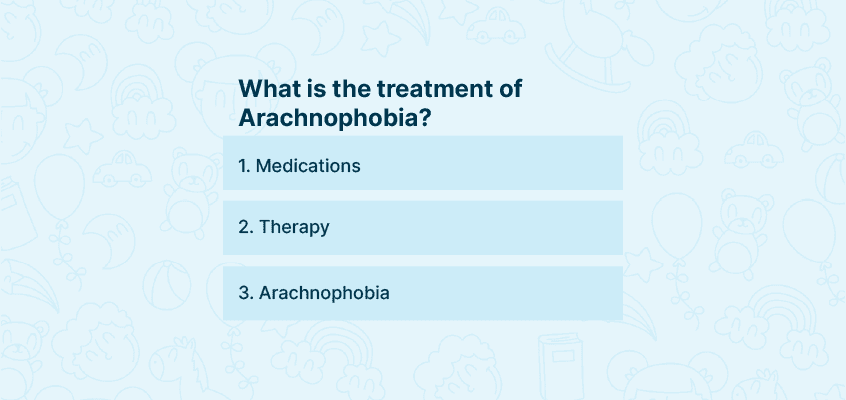Introduction
Arachnophobia is the intense fear of spiders. Although it is not uncommon for people to dislike spiders, phobias tend to have a far more significant impact on a person’s life, interfering with their capacity to carry out their daily activities and preventing a person from socialising with their friends and family.
Our Wellness Programs
What is Arachnophobia?
Arachnophobia, also known as spider phobia, is an intense and irrational fear of spiders and other arachnids. Arachnophobia comes under specific phobias, intense fear of something or someone that may cause little to no danger to the person. Approximately 3 per cent to 15 per cent of individuals have been diagnosed with specific phobias.
Everyone fears something, and while it is natural to avoid the object of our fear, Arachnophobia causes intense and paralysing fear to the point where even thinking about them can immediately cause the symptoms of anxiety in the person. It can interfere with the individual’s daily life, complicate relationships, and reduce self-confidence and self-esteem.

Looking for services related to this subject? Get in touch with these experts today!!
Experts

Kirti Bajpai

India
Psychologist
Experience: 5 years

Neelam Parwani

India
Life Coach
Experience: 5 years

Mansi Chawla

India
Psychologist
Experience: 12 years
What are the symptoms of Arachnophobia?
The symptoms of Arachnophobia are similar to that of a panic attack. They are:
- Immediate anxiety or fear when an individual thinks of spiders and arachnids
- Avoidance of spiders
- Trouble breathing
- Shaking
- Sweating
- Increased heart rate
- Nausea
- Dizziness
- Dry mouth
- Upset stomach
How do people behave if he has Arachnophobia
An individual with Arachnophobia may display the following behaviours.
- They avoid places and situations where they may have to encounter spiders
- They may cry or run if they see a spider
- They may freeze in fear at the sight or picture of a spider
- They avoid social activities and situations out of their fear
- They have difficulty concentrating on daily tasks due to their fear of spiders
What is the treatment of Arachnophobia?
Like any other phobia, therapists use the following methods to treat Arachnophobia.
- Medications – Although medications may not treat the overall phobia, they are prescribed for short periods to decrease anxiety symptoms. Such drugs include antidepressants, sedatives, beta-blockers, tranquillisers, and supplements for anxiety.
- Therapy – Going through therapy sessions and medications may help prevent Arachnophobia over time. Your therapist may try cognitive behavioural therapy to change your thoughts and behaviour associated with spider phobia. They may also go for exposure therapy, where they gradually and repeatedly expose the individual to the spiders until they feel comfortable enough to face them.
Ten simple ways to get rid of Arachnophobia
Without the proper treatment, Arachnophobia may trouble people their entire lives and isolate them from their families. Fortunately, 90% of the individuals improve the symptoms within a few months with the appropriate treatment. The following paragraph talks about ten ways an individual can get rid of Arachnophobia. They are:
- Exposure therapy is a type of psychotherapy where individuals are gradually and repeatedly exposed to the feared situation or object until they get comfortable in a safe environment. The therapist may initially show the individual pictures of spiders frequently until they get comfortable looking at the pictures. Once you cross this level, the next level requires facing spiders in real life by initially seeing them from afar and then touching them.
- Cognitive Behavioural Therapy (CBT) – This type of psychotherapy focuses on shifting and reframing thoughts and perspectives related to spiders. Doing so can benefit the individual by lowering their fear in reaction to the spiders.
- Systematic Desensitisation – This type of psychotherapy where the individual is first taught relaxation techniques and then gradually exposed to spiders when they are relaxed, learning to cope with their fear of spiders healthily.
- Medications – The doctor may prescribe medications that reduce the intensity of anxiety symptoms when one faces the spiders. Combined with therapy, they prove relief, and individuals see improvement in months. The doctor may prescribe anxiolytics such as Xanax or Valium to ease the symptoms.
- Hypnotherapy is one of the oldest forms of psychotherapy. The therapist teaches the individual various relaxation techniques to calm their senses and focus their attention away from the source of fear.
- Eating a well-balanced diet – Eating a diet rich in proteins, vegetables, and fruits and low in carbohydrates and fat can reduce your overall level of anxiety and keep you healthy in the long run.
- Reduced intake of caffeine and alcohol – Studies indicate that drinking coffee or alcohol may increase one’s level of agitation, anxiety, and fear towards spiders. Drinking limited amounts of caffeine and alcohol can keep your stress under control.
- Engage in physical activity – Regularly engaging in physical activity for 30 minutes to 45 minutes releases endorphins, reducing anxiety stress and boosting your overall mood.
- Join a support group – Join a support group of individuals who experience specific phobias. Knowing that you are not alone and sharing the experience with many people can bring comfort to the individual. They may also share tips that may help manage your phobia better.
- Relaxation techniques – Learning relaxation techniques such as progressive muscle relaxation, mindfulness, or yoga may reduce shallow breathing associated with anxiety and teach one to focus on their breathing to calm themselves. Practising these techniques provides the individual with the foundation and courage to face their phobia.
Conclusion
Arachnophobia is an irrational and intense fear of spiders that can range from negative past experiences. Arachnophobia causes dizziness, nausea, increased heart rate and may involve the individual avoiding specific locations that may bring them in contact with spiders. The individual may seek medical help if Arachnophobia makes the individual incapable of performing daily activities. Medications, exposure therapy, or leading a healthy life can go a long way in reducing the symptoms and curing one of Arachnophobia.


















